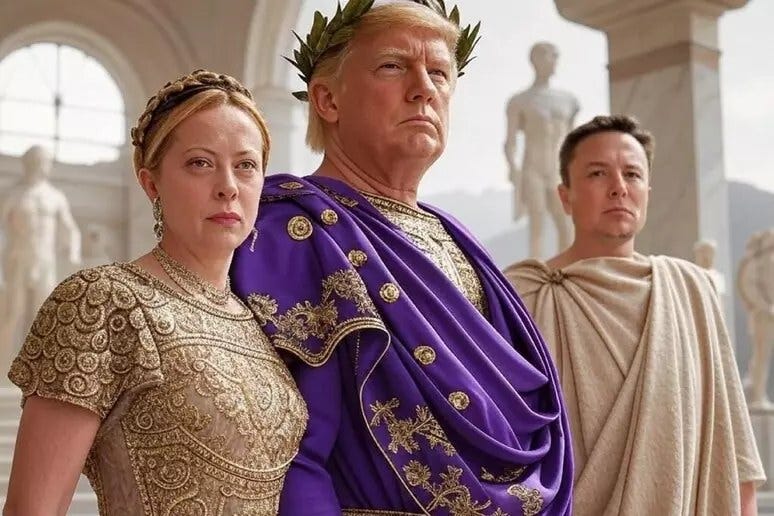Elon who?
Plus, why now is the perfect time to visit Gorizia, and a trio of exhibits at Milan’s Palazzo Reale
Hello readers and welcome back to the Week in Italy. I hope you’ve all enjoyed a restorative break and some time away from the news which, if the first week of January is anything to go by, is only getting crazier. It’s been a busy festive season. Meloni’s government got its controversial budget through parliament, Matteo Salvini was acquitted of kidnapping charges in the Open Arms trial, Iranian authorities detained and released the Italian journalist Cecilia Sala for unspecified motives, and Giorgia Meloni flew to the U.S.A. where she seems to have successfully schmoozed the incoming President, Donald Trump. One story in particular, though, really caught my eye. Earlier this week news broke that the Italian government is in advanced talks with Elon Musk about a possible 1.5bn euro deal to purchase cyber security services from the tech billionaire’s SpaceX Starlink satellite. Yep, you read that correctly. Italy, a sovereign nation state, is considering hiring one of the world’s most controversial private companies to store its public bureaucracy and military data. Words can hardly convey how worrying this prospect is. Journalists of all stripes have voiced concern about Musk’s unpredictability, about SpaceX’s ambiguous legal status and the risk of data breaches. Others are concerned with national security risks, not to mention the political optics vis-à-vis Italy’s position in the EU. The deal has not yet been signed, but certain ministers are already bragging about this apparent “win.” As Salvini put it in a recent interview “others [in Europe] will soon be following suit. This is the future!” Hmm. Quite how Lega supporters can square selling out the country’s data with their ‘sovereignist/nationalist agenda’, I’d love to know. But that’s for another time. For now, check out the details over at Euractiv.

“We’re used to thinking about how the weight of history shapes our culture, our politics, our psyches, but the future has weight, too—perhaps, these days, a growing weight.” These words from Joshua Rothman’s latest piece in The New Yorker really struck a chord with me this week. Because at times like these, it’s undeniable: with our inherited teleologies falling to pieces we need to change the way we think about the very idea of the future. It’s fitting, in such conditions, that Gorizia and Nova Goricia are about to take up the mantle of twin European capitals of culture for 2025. Indeed, one could hardly think of a better venue for our times. For most of its history, Gorizia was a unified political community. After WWII, however, the Allies drew up new borders splitting the town in two: the ‘old’ Gorizia was assigned to Italy and the ‘new’ one to Slovenia. A frontier was established and a wall erected, but the communities continued to mix defiantly in polyglot, multicultural solidarity. Noah Charney has written an excellent piece for the BBC about how ideology and conflict has shaped this territory, but the real power of the story is its example of how humans can find common ground and build cultural bridges regardless of the agendas of statesmen and bureaucrats. Gorizia is a wonderful place, and with so much planned as part of the #GO!2025 programme, now is the perfect time to visit.

I’ve written repeatedly in this newsletter about Italy’s struggles to effectively regulate tourism in the country’s best known cities. In fact, it’s rapidly becoming a major theme in my writing in general and I’m certainly not alone in this preoccupation. A friend of mine — another Tuscan-based writer, Kamin Mohammadi — recently recorded a documentary for the BBC about the impact that hyper-tourism and new technologies are having on a single road in Florence. ‘The street that tech built’ tells the story of Via San Niccolo and the changes that have taken place in the surrounding neighbourhood during the 16 years she has been living here. Kamin speaks to friends and business owners in the area, as well as interviewing a few familiar faces from the Italy journalism world. She even poses a few targeted questions to the mayor of Florence, Sara Funaro (though I’m afraid the mayor was only able to offer a few platitudes about her then-nascent ten-point plan in response). Still, the whole thing is worth a listen. Check out the recording below, and make sure to follow Kamin’s own Italy-focused substack ‘Bella Figura Redux’ here.
Arts and culture: You're so Art Deco
Italy’s art calendar is always chock-a-block at this time of year with a frankly intimidating number of exhibits to check out. If you’re unsure of what to visit, though, I’d make the case for Milan’s Palazzo Reale, which is certainly one of the most interesting exhibition spaces in the country. Three mostre in particular have caught my eye this winter. On 15 February the gallery is hosting a retrospective dedicated to the life and work of Felice Casorati, the painter, sculptor and print maker who so deftly captured the melancholy of family life under Mussolini’s rule. A couple of weeks later, on 25 February, the museum will celebrate the centenary of the 1925 Paris expo with a special show dedicated to Italian and European Art Deco. Finally, on 26 February doors will open on a much-anticipated Leonor Fini show; the largest collection of the Argentine surrealist’s work ever to be displayed in Italy with drawings, photography, decorative art, and fashion designs on display alongside the paintings. I’ll be heading to all three exhibits next month and will probably share some ad hoc impressions via Instagram. So follow me there if you don’t already.
Looking for an Italian movie to see in 2025? Well, Roberto Andò’s L’abbaglio seems like a good place to start. The film, which is released next week, is set in 1860 during Garibaldi’s mission to Sicily at the beginning of his campaign to unify Italy. This is well trodden terrain for TV dramas, I know. But still, this one looks a little different. While most on-screen histories have focused on the hero himself (think of 2007’s Eravamo solo mille) Andò has elected to move away from the “cult of personality” to instead focus on the experience of the “normal” Red Shirts who struggled to make sense of history as it was unfolding around them. Toni Servillo stars as the esteemed general Vincenzo Giordano Orsini, but the real protagonists are Salvatore Ficcara and Valentino Picone who play a pair of Sicilian workers seeking to secure their own advantages amidst the chaos of revolution. Based on the trailer this looks to be one of those strange and very Italian drama-comedy mash-ups which tend to be hit and miss. Still, the subject is interesting, the cinematography looks beautiful and given the cast it’s probably well worth a watch.
Recipe of the week: prawn, avocado and orange salad
For better or worse Italians don’t really do Veganuary or Dry January or any of that stuff. Still, looking at peoples’ supermarket trollies it’s clear that the feste are well and truly over. The shelves are finally free of discount panettone and pandoro and the oranges, cabbages and green vegetables are centre stage once again. I have to say, I myself could do with a cold, crisp salad right now. Generally speaking, Italian salads tend to be pretty pomodoro heavy, which can make it tough to assemble something fresh at this time of year. Luckily, La Cucina Italiana has an intriguing suggestion in the latest January issue in the form of a Sicilian fennel and orange salad, bulked up in American inspired fashion with some avocado, celeriac and an aromatized mayonnaise. Delicious, and just what the doctor ordered after all that Christmas food [this one’s ITA only but the instructions should be simple enough for google translate if you don’t read the language].
Finally a short note: as some of you know I’m back to freelancing this year after taking the plunge and leaving my day job at the end of 2024. The Week in Italy is a pleasure to write, and I put a lot of work into it. But this is only possible thanks to a core group of dedicated paying supporters who keep the show running. You know who you are and I want to thank you once again, from the bottom of my heart.
For everyone else, here’s the pitch: if a just a handful more of you choose to chip-in, I’ll be able to continue writing these updates with peace of mind at a time when AI generated listicle content is taking over journalism, rates are plummeting and sponsored content reigns supreme. That’s it. I’m done now, and I promise I won’t be making a habit of this. You know the drill. If you enjoy this newsletter, get value out of it, and believe in independent reporting, please consider a paid subscription.







